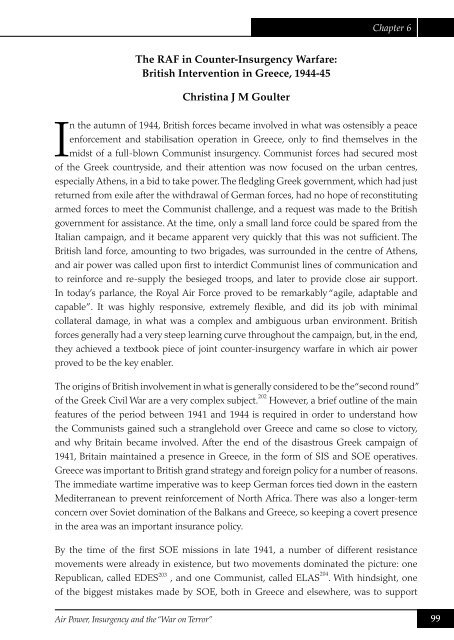Air Power, Insurgency and the âWar on Terrorâ - Prof. Joel Hayward's ...
Air Power, Insurgency and the âWar on Terrorâ - Prof. Joel Hayward's ...
Air Power, Insurgency and the âWar on Terrorâ - Prof. Joel Hayward's ...
Create successful ePaper yourself
Turn your PDF publications into a flip-book with our unique Google optimized e-Paper software.
Chapter 6<br />
The RAF in Counter-<str<strong>on</strong>g>Insurgency</str<strong>on</strong>g> Warfare:<br />
British Interventi<strong>on</strong> in Greece, 1944-45<br />
Christina J M Goulter<br />
In <str<strong>on</strong>g>the</str<strong>on</strong>g> autumn of 1944, British forces became involved in what was ostensibly a peace<br />
enforcement <str<strong>on</strong>g>and</str<strong>on</strong>g> stabilisati<strong>on</strong> operati<strong>on</strong> in Greece, <strong>on</strong>ly to find <str<strong>on</strong>g>the</str<strong>on</strong>g>mselves in <str<strong>on</strong>g>the</str<strong>on</strong>g><br />
midst of a full-blown Communist insurgency. Communist forces had secured most<br />
of <str<strong>on</strong>g>the</str<strong>on</strong>g> Greek countryside, <str<strong>on</strong>g>and</str<strong>on</strong>g> <str<strong>on</strong>g>the</str<strong>on</strong>g>ir attenti<strong>on</strong> was now focused <strong>on</strong> <str<strong>on</strong>g>the</str<strong>on</strong>g> urban centres,<br />
especially A<str<strong>on</strong>g>the</str<strong>on</strong>g>ns, in a bid to take power. The fledgling Greek government, which had just<br />
returned from exile after <str<strong>on</strong>g>the</str<strong>on</strong>g> withdrawal of German forces, had no hope of rec<strong>on</strong>stituting<br />
armed forces to meet <str<strong>on</strong>g>the</str<strong>on</strong>g> Communist challenge, <str<strong>on</strong>g>and</str<strong>on</strong>g> a request was made to <str<strong>on</strong>g>the</str<strong>on</strong>g> British<br />
government for assistance. At <str<strong>on</strong>g>the</str<strong>on</strong>g> time, <strong>on</strong>ly a small l<str<strong>on</strong>g>and</str<strong>on</strong>g> force could be spared from <str<strong>on</strong>g>the</str<strong>on</strong>g><br />
Italian campaign, <str<strong>on</strong>g>and</str<strong>on</strong>g> it became apparent very quickly that this was not sufficient. The<br />
British l<str<strong>on</strong>g>and</str<strong>on</strong>g> force, amounting to two brigades, was surrounded in <str<strong>on</strong>g>the</str<strong>on</strong>g> centre of A<str<strong>on</strong>g>the</str<strong>on</strong>g>ns,<br />
<str<strong>on</strong>g>and</str<strong>on</strong>g> air power was called up<strong>on</strong> first to interdict Communist lines of communicati<strong>on</strong> <str<strong>on</strong>g>and</str<strong>on</strong>g><br />
to reinforce <str<strong>on</strong>g>and</str<strong>on</strong>g> re-supply <str<strong>on</strong>g>the</str<strong>on</strong>g> besieged troops, <str<strong>on</strong>g>and</str<strong>on</strong>g> later to provide close air support.<br />
In today’s parlance, <str<strong>on</strong>g>the</str<strong>on</strong>g> Royal <str<strong>on</strong>g>Air</str<strong>on</strong>g> Force proved to be remarkably “agile, adaptable <str<strong>on</strong>g>and</str<strong>on</strong>g><br />
capable”. It was highly resp<strong>on</strong>sive, extremely flexible, <str<strong>on</strong>g>and</str<strong>on</strong>g> did its job with minimal<br />
collateral damage, in what was a complex <str<strong>on</strong>g>and</str<strong>on</strong>g> ambiguous urban envir<strong>on</strong>ment. British<br />
forces generally had a very steep learning curve throughout <str<strong>on</strong>g>the</str<strong>on</strong>g> campaign, but, in <str<strong>on</strong>g>the</str<strong>on</strong>g> end,<br />
<str<strong>on</strong>g>the</str<strong>on</strong>g>y achieved a textbook piece of joint counter-insurgency warfare in which air power<br />
proved to be <str<strong>on</strong>g>the</str<strong>on</strong>g> key enabler.<br />
The origins of British involvement in what is generally c<strong>on</strong>sidered to be <str<strong>on</strong>g>the</str<strong>on</strong>g> “sec<strong>on</strong>d round”<br />
of <str<strong>on</strong>g>the</str<strong>on</strong>g> Greek Civil War are a very complex subject. 202 However, a brief outline of <str<strong>on</strong>g>the</str<strong>on</strong>g> main<br />
features of <str<strong>on</strong>g>the</str<strong>on</strong>g> period between 1941 <str<strong>on</strong>g>and</str<strong>on</strong>g> 1944 is required in order to underst<str<strong>on</strong>g>and</str<strong>on</strong>g> how<br />
<str<strong>on</strong>g>the</str<strong>on</strong>g> Communists gained such a stranglehold over Greece <str<strong>on</strong>g>and</str<strong>on</strong>g> came so close to victory,<br />
<str<strong>on</strong>g>and</str<strong>on</strong>g> why Britain became involved. After <str<strong>on</strong>g>the</str<strong>on</strong>g> end of <str<strong>on</strong>g>the</str<strong>on</strong>g> disastrous Greek campaign of<br />
1941, Britain maintained a presence in Greece, in <str<strong>on</strong>g>the</str<strong>on</strong>g> form of SIS <str<strong>on</strong>g>and</str<strong>on</strong>g> SOE operatives.<br />
Greece was important to British gr<str<strong>on</strong>g>and</str<strong>on</strong>g> strategy <str<strong>on</strong>g>and</str<strong>on</strong>g> foreign policy for a number of reas<strong>on</strong>s.<br />
The immediate wartime imperative was to keep German forces tied down in <str<strong>on</strong>g>the</str<strong>on</strong>g> eastern<br />
Mediterranean to prevent reinforcement of North Africa. There was also a l<strong>on</strong>ger-term<br />
c<strong>on</strong>cern over Soviet dominati<strong>on</strong> of <str<strong>on</strong>g>the</str<strong>on</strong>g> Balkans <str<strong>on</strong>g>and</str<strong>on</strong>g> Greece, so keeping a covert presence<br />
in <str<strong>on</strong>g>the</str<strong>on</strong>g> area was an important insurance policy.<br />
By <str<strong>on</strong>g>the</str<strong>on</strong>g> time of <str<strong>on</strong>g>the</str<strong>on</strong>g> first SOE missi<strong>on</strong>s in late 1941, a number of different resistance<br />
movements were already in existence, but two movements dominated <str<strong>on</strong>g>the</str<strong>on</strong>g> picture: <strong>on</strong>e<br />
Republican, called EDES 203 , <str<strong>on</strong>g>and</str<strong>on</strong>g> <strong>on</strong>e Communist, called ELAS 204 . With hindsight, <strong>on</strong>e<br />
of <str<strong>on</strong>g>the</str<strong>on</strong>g> biggest mistakes made by SOE, both in Greece <str<strong>on</strong>g>and</str<strong>on</strong>g> elsewhere, was to support<br />
<str<strong>on</strong>g>Air</str<strong>on</strong>g> <str<strong>on</strong>g>Power</str<strong>on</strong>g>, <str<strong>on</strong>g>Insurgency</str<strong>on</strong>g> <str<strong>on</strong>g>and</str<strong>on</strong>g> <str<strong>on</strong>g>the</str<strong>on</strong>g> “War <strong>on</strong> Terror” 99





